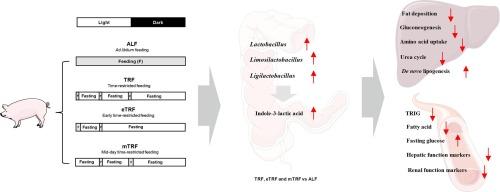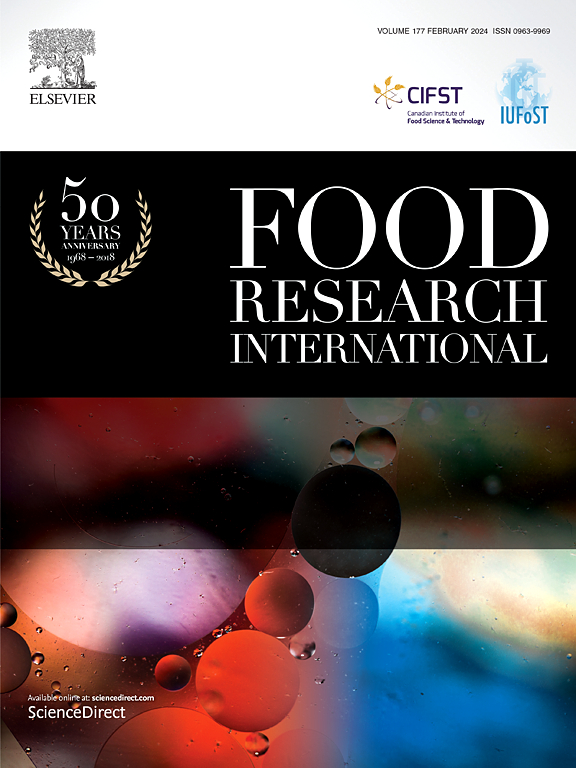Different time-restricted feeding patterns potentially modulate metabolic health by altering tryptophan metabolism of gut microbes in pigs
IF 7
1区 农林科学
Q1 FOOD SCIENCE & TECHNOLOGY
引用次数: 0
Abstract
Time-restricted feeding has emerged as a preferred approach for alleviating metabolic disorders, but the potential microbiological mechanism remains poorly understood. This study used a growing pig model to mimic common-sense eating habits. Four feeding patterns were set up, including ad libitum feeding (ALF) for daily irregulated eating habits, time-restricted feeding (TRF) for three meals a day, early time-restricted feeding (eTRF) for skipping dinner and mid-day time-restricted feeding (mTRF) for skipping breakfast. The results showed that the three time-restricted feeding patterns (TRF, eTRF and mTRF) resulted in a reduction of hepatic fat accumulation and a decrease in hepatic function markers compared to the ALF pattern. However, this was independent of food consumption. Transcriptome analysis of the liver showed that the three time-restricted feeding patterns downregulated the expression of genes related to gluconeogenesis, β-oxidation, lipid accumulation, and urea cycle, and upregulated the expression of genes related to lipogenesis and glycolysis compared to the ALF pattern. Microbiome and metabolome analyses showed that Lactobacillus enriched in the colon of pigs in three time-restricted groups were negatively correlated with serum triglyceride. Meanwhile, three time-restricted feeding patterns elevated the levels of the microbial metabolite indole-3-lactic acid, which was further confirmed to reduce excessive hepatic lipid accumulation in vitro. Overall, time-restricted feeding potentially improved metabolic health by modulating gut microbiota and metabolites.

不同的限时饲喂模式可通过改变猪肠道微生物的色氨酸代谢来调节代谢健康
限时喂养已成为缓解代谢紊乱的首选方法,但人们对其潜在的微生物机制仍然知之甚少。本研究使用生长猪模型模拟常识性饮食习惯。该研究设置了四种喂养模式,包括自由采食(ALF)--代表日常饮食习惯不规律;限时喂养(TRF)--代表一日三餐;早期限时喂养(eTRF)--代表不吃晚餐;中午限时喂养(mTRF)--代表不吃早餐。结果显示,与ALF模式相比,三种限时喂养模式(TRF、eTRF和mTRF)都能减少肝脏脂肪堆积,降低肝功能指标。然而,这与食物消耗量无关。肝脏转录组分析表明,与ALF模式相比,三种限时喂养模式下调了与葡萄糖生成、β-氧化、脂质积累和尿素循环相关的基因的表达,上调了与脂肪生成和糖酵解相关的基因的表达。微生物组和代谢组分析表明,三种限时组猪结肠中富含的乳酸杆菌与血清甘油三酯呈负相关。同时,三种限时饲喂模式都能提高微生物代谢物吲哚-3-乳酸的水平,这进一步证实了吲哚-3-乳酸能减少体外肝脏脂质的过度积累。总之,限时喂养可通过调节肠道微生物群和代谢物来改善代谢健康。
本文章由计算机程序翻译,如有差异,请以英文原文为准。
求助全文
约1分钟内获得全文
求助全文
来源期刊

Food Research International
工程技术-食品科技
CiteScore
12.50
自引率
7.40%
发文量
1183
审稿时长
79 days
期刊介绍:
Food Research International serves as a rapid dissemination platform for significant and impactful research in food science, technology, engineering, and nutrition. The journal focuses on publishing novel, high-quality, and high-impact review papers, original research papers, and letters to the editors across various disciplines in the science and technology of food. Additionally, it follows a policy of publishing special issues on topical and emergent subjects in food research or related areas. Selected, peer-reviewed papers from scientific meetings, workshops, and conferences on the science, technology, and engineering of foods are also featured in special issues.
 求助内容:
求助内容: 应助结果提醒方式:
应助结果提醒方式:


